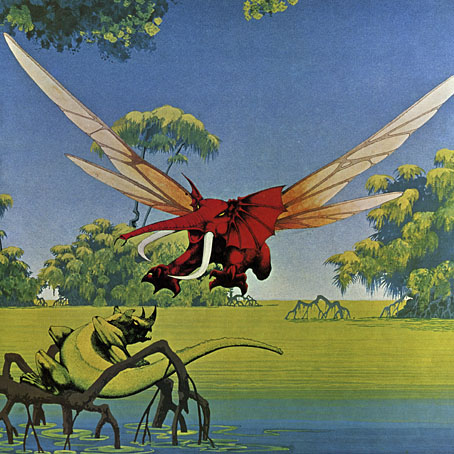
Cover art by Roger Dean for Woyaya (1971), the second album by Osibisa. Dean’s flying elephants made their first appearance on the group’s debut album, and have been an Osibisa emblem ever since.
• Many of Roger Dean’s early album covers are better creations than the music on the albums they decorate. This isn’t the case with Osibisa, however, a Ghanaian group based in London whose discography includes (uniquely, I think) two covers by Dean together with one by Mati Klarwein. The group’s first two albums, Osibisa and Woyaya, are exceptional blends of Ghanaian music with rock, funk and jazz whose omission from the generally reliable Kozmigroov list is a serious error. Garth Cartwright talked to Teddy Osei and Lord Eric Sugumugu about Osibisa past and present.
• “The antiheroes of Angry Young Men cinema railed against the limited life opportunities available to them. Wired and frustrated, they especially chafed against girlfriends, wives, domesticity. Yet they never questioned heterosexuality itself. Not, at least, until The Leather Boys (1964), a relatively little-known film directed by Canadian expatriate Sidney J. Furie.” Sukhdev Sandhu on a film about gay life in pre-decriminalisation Britain that offered a slightly more positive view of its subject than the justifiably angst-ridden Victim (1961).
• “Brian Aldiss once confided to me that the big problem with American science fiction writers was that they loved to write about Mars but knew nothing about Indonesia.” Bruce Sterling on the attractions of being an expatriate writer who adopts a foreign persona, as he did for the stories collected in Robot Artists and Black Swans.
• New music: Fire Tower by The Grid / Fripp. Dave Ball, Richard Norris and Robert Fripp have been collaborating on and off since The Grid’s 456 album in 1992. Fire Tower is a preview of Leviathan, a new album out in June on CD/DVD and double vinyl.
• RIP Michael Collins, the astronaut who orbited the Moon alone, listening to Symphonie Fantastique by Berlioz in the Command Module of Apollo 11 while Neil Armstrong and Buzz Aldrin were walking on the satellite’s surface.
• “‘Walking with a thesis’ could easily function as the subtitle for a significant number of Iain Sinclair’s books.” Tobias Carroll on Iain Sinclair and the radical act of walking through a city.
• “‘Plain speaking, like plain food, is a puritan virtue and thus no virtue at all,’ Meades pronounces.” Steven Poole reviews Pedro and Ricky Come Again by Jonathan Meades.
• Building a panorama: Clive Hicks-Jenkins‘ latest progress report on his Cocteau-inspired illustrated edition of Beauty and the Beast.
• At Unquiet Things: Groovy Goddesses From Dimension X: Gene Szafrans’ Kaleidoscopic Book Covers.
• From leather boys to leather men: Miss Rosen on the little-known photography of Tom of Finland.
• Alexis Petridis attempts the impossible again, with a list of Grace Jones’ best songs.
• At Dennis Cooper‘s: Cars.
• I’m A Leather Boy (1967) by The Leather Boy | Warm Leatherette (1980) by Grace Jones | Leather Bound (2017) by Patrick Cowley

John, recently you were lamenting in a post about unnecessary alternative soundtracks to Tarkovsky’s ‘Solaris’. One of the few people I can imagine replacing Atremyev would be Fripp. I have always preferred Fripp’s solo stuff and his collaborations and I’ve often wondered why no one has used Fripp’s loops and drones as a soundtrack. Maybe Fripp himself is not keen on it but it would seem a natural.
I was always fascinated by Michael Collins because he was the first of a small group of human beings who have been granted the experience of being truly alone with the universe. The only piece of real literature produced by one of the participants of the space program was Collins’ ‘Carrying the Fire’. It is thoughtful and lyrical and personally revealing in a way that the astronauts were never otherwise allowed to be.
For an organization that depended so much on the good will and support of the public I could never understand NASA’s attitude toward the astronauts. They insisted on the projection of the archetype of the strong, silent hero, competent and aloof, leeched of all personality. In rare interviews Collins came off as witty and irreverent, a guy who could have probably been a fair standup comedian. I remember thinking, why wasn’t he on every chat show in the western world, selling the space program? A tremendous opportunity was blown. After Apollo budgets dried up and the perception became that everyone had lost interest. Instead of the beginning of something Apollo became an ending.
I imagine Fripp would be open to a soundtrack commission, he’s worked for years as a session player so he’s used to following a brief. There are quite a few films listed at IMDB as using his music but they’re mostly songs taken from records rather than new pieces. Lots of King Crimson as you’d expect.
The Apollo astronauts were seldom seen here outside news broadcasts so for me they were always remote, mysterious figures. I still knew their names, however. They meant much more to me growing up than did the sports players my friends were keen on. I forget where I got the Berlioz trivia from but it was either For All Mankind or Apollo 11, both of which feature Collins.